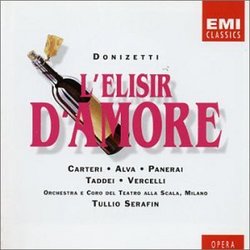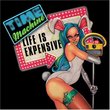| All Artists: Gaetano Donizetti, Norberto Mola, Tullio Serafin, La Scala Theater Orchestra, Angela Vercelli, Giuseppe Taddei, Luigi Alva, Rolando Panerai, Rosanna Carteri Title: Donizetti: L'elisir d'amore Members Wishing: 0 Total Copies: 0 Label: Angel Records Release Date: 11/5/2002 Album Type: Limited Edition, Original recording reissued Genre: Classical Style: Opera & Classical Vocal Number of Discs: 2 SwapaCD Credits: 2 UPC: 724356565821 |
Search - Gaetano Donizetti, Norberto Mola, Tullio Serafin :: Donizetti: L'elisir d'amore
 | Gaetano Donizetti, Norberto Mola, Tullio Serafin Donizetti: L'elisir d'amore Genre: Classical
|
Larger Image |
CD DetailsSimilar CDs |
CD ReviewsFine studio-made "L'elisir" with a Grand Old Man conducting L. E. Cantrell | Vancouver, British Columbia Canada | 01/29/2007 (5 out of 5 stars) "SOURCE: Studio production recorded in August 1958 at La Scala in Milan.
SOUND: Perfectly acceptable early analogue stereo. The digital remastering of 1993 is generally satisfactory, making this one of the more successful offerings from the EMI in that era. CAST: Adina, a prosperous country landowner who is flirtatious, flighty and a bit pig-headed - Rosanna Carteri (soprano); Nemorino, a country bumpkin and prize chump who is hopelessly in love with Adina - Luigi Alva (tenor); Belcore, a sergeant in a regiment encamped near Adina's farm who is hopelessly in love with ... Belcore but also determined to marry Adina - Rolando Panerai (baritone); Doctor Dulcamara, a traveling quack, a purveyor of bogus nostrums and fake love potions who is in love with money ... and his next meal - Giuseppe Taddei (baritone); Gianetta, a country girl who is not entirely averse to snagging a wealthy husband - Angela Vercelli (mezzo-soprano). CONDUCTOR: Tullio Serafin with the Orchestra e Coro del Teatro alla Scala, Milano. DOCUMENTATION: Libretto in Italian and English. Brief history of the opera and summary of the plot that ties into the CD tracks. Track list with timings. TEXT: This recording offers the standard, stage-proven version of "L'elisir" that was in use when it was recorded. In the Nineteenth Century, before Verdi came close to eliminating the practice in Italy, operas were expanded, cut and reshaped at the whim of impresarios, based on what their ticket-buying audiences wanted or were accustomed to. This led to variant editions and alternative versions, sometimes arising from the egos of local singers and more often from their technical limitations. My test for a performance is not whether it is "complete" but whether it works. This performance works. COMMENTARY: "L'elisir d'amore" is one of the many operas that can be traced back to that ubiquitous hack of all seasons, Eugene Scribe. Scribe's original libretto, "Le philtre," had been set to music by Auber in 1831, to no particular effect. In 1832, Donizetti needed a libretto on short notice. His librettist, Felice Romani, knew a good thing when he could steal it. He quickly paraphrased "Le philtre" into Italian doggerel as "L'elisir d'amore." Donizetti devoted a long time--a whole month!--to setting the words to music. "L'elisir d'amore" opened at La Scala in May 1832. It enjoyed a triumph. Unlike most bel canto operas, "L'elisir d'amore" never faded away. It has held its position in the standard operatic repertory from the night it opened. Tullio Serafin (1878-1968) was one of the Grand Old Men among Italian conductors. Arturo Toscanini hired him to be an assistant conductor at La Scala in 1898. He became principal conductor there in 1909. In the 1920s and 30s he was an important conductor at the Metropolitan in New York. He was particularly skilled at developing the careers of great singers. Before World War II he guided Rosa Ponselle on her path to superstardom. After the war he oversaw the transformation of Maria Callas from Wagnerian to bel canto soprano and was her collaborator in her ascent to the status of "La Divina." (The date when Callas threw him aside in a dispute over a recording of "La Traviata" is as good as any to mark the beginning of her fall.) He was also important to the early career of Joan Sutherland. Serafin was one of the great expanders of the operatic repertory, both in premiering new works and in reviving faded ones. He is the central figure in the mid-Twentieth Century revival of bel canto and the successful re-entry of many bel canto operas into the standard repertory. With regard to this recording, some have complained that the eighty year-old Serafin had slowed down, but no-one could possibly deny his deep feeling for and understanding of the opera. For my own part, while I have heard some parts of "L'elisir" go faster, I am not entirely convinced that I have heard them sound better for it. The two best known names in this strong cast are the baritones, Rolando Panerai and Giuseppe Taddei. Panerai is excellent as that preening military man, Sergeant Belcore. Taddei is even better as that quick-witted quack, Doctor Dulcamara. Nine years later he would sing Belcore in a fabulous live performance with Scotto and Bergonzi at the Florence May Festival (available from Opera d'Oro), but here Taddei clearly demonstrates that he was born to be an unmitigated purveyor of phoney love potions. Rosanna Carteri is very good, a little heftier in voice than other famous Adinas but still very sound, very earthy. Luigi Alva is lighter in voice than Pavarotti and Bergonzi, two famous recorded Nemorinos, although heavier than the typical ultra-light bel canto so-called "specialists" of today. If he is less exciting than Pavarotti and Bergonzi he is almost certainly closer to the kind of tenor that Donizetti had in mind when he wrote the piece. All things considered, Alva is very satisfying as that love-sick goof Nemorino. Angela Vercelli is competent in the small part of Gianetta. This is not the best-known "L'elisir" but it is a well-considered and authentic, very Italianate performance from beginning to end. I give five stars for the grand old geezer's final go at a great operatic comedy." |

 Track Listings (20) - Disc #1
Track Listings (20) - Disc #1
